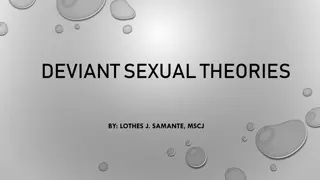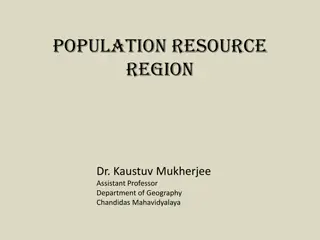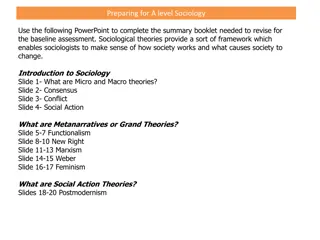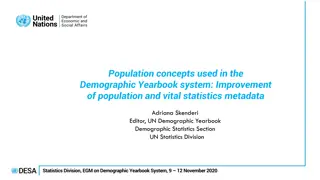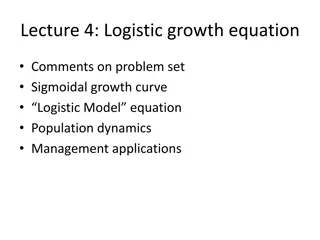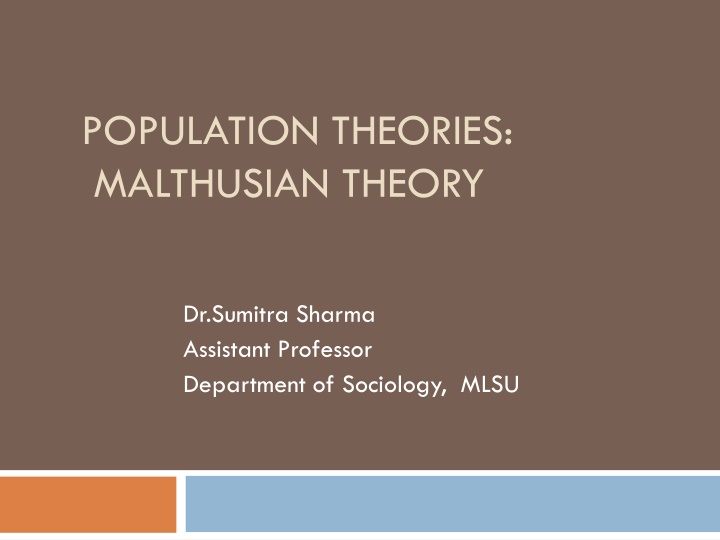
Malthusian Theory of Population
Explore the Malthusian Theory of Population proposed by Thomas Robert Malthus, outlining the concept of population growth outpacing food supply, leading to overpopulation. Learn about the main principles, checks on population, and the imbalance between population and food supply.
Download Presentation

Please find below an Image/Link to download the presentation.
The content on the website is provided AS IS for your information and personal use only. It may not be sold, licensed, or shared on other websites without obtaining consent from the author. If you encounter any issues during the download, it is possible that the publisher has removed the file from their server.
You are allowed to download the files provided on this website for personal or commercial use, subject to the condition that they are used lawfully. All files are the property of their respective owners.
The content on the website is provided AS IS for your information and personal use only. It may not be sold, licensed, or shared on other websites without obtaining consent from the author.
E N D
Presentation Transcript
POPULATION THEORIES: MALTHUSIAN THEORY Dr.Sumitra Sharma Assistant Professor Department of Sociology, MLSU
Thomas Robert Malthus 1766-1834
Life History of Malthus T. R. Malthus was born in February1766, in England & died in December 1834. Malthus is an English economist and demographer who is best known for his theory that population growth will always tend to outrun the food supply and that betterment of humankind is impossible without strict limits on reproduction. This thinking is commonly referred to as Malthusianism. Books:- An Essay on the Principle of Population (1798)
Malthusain Theory of Population 1. Main aspects of the Principles :- instinct in human beings to increase at a fast rate of population (2) Food is essential for existence of life (3) direct relations between reproduction (4) Increasing & decreasing rules apply on agriculture 2. Population Increase in geometrical ratio 3. Food material increased in arithmetic ratio 4. Imbalance between Population & food . Checks on Population :- (I) Positive or Natural Preventive Checks:- Moral restraint prevention (I) natural sex economic prosperity & (II) & artificial
Malthusain theory of Population Malthusian theory explains the relationship between the growth in food supply and in population. It states that population increases faster than food supply and if unchecked leads to vice or misery. There is a natural sex instinct in human beings to increase at a fast rate. As a result, population increases in geometrical progression and if unchecked doubles itself every 25 years. Thus starting from 1, population in successive periods of 25 years will be 1, 2, 4, 8, 16, 32, 64, 128, and 256.
Continue. On the other hand, the food supply increases in a slow arithmetical progression due to the operation of the law of diminishing returns based on the supposition that the supply of land is constant. Thus the food supply in successive similar periods will be 1, 2, 3, 4, 5, 6, 7, 8, 9... Since population increases in geometrical progression and the food supply in arithmetical progression, population tends to outrun food supply. Thus an imbalance is created which leads to over-population.
The food supply in arithmetical progression is measured on the horizontal axis and the population in geometrical progression on the vertical axis. The curve M is the Malthusian population curve which shows the relation between population growth and increase in food supply. It rises upward swiftly.
To control over-population resulting from the imbalance between population and food supply, Malthus suggested preventive checks and positive checks. The preventive checks are applied by a man to control the birth rate. They are foresight, late marriage, celibacy, moral restraint, etc. If people fail to check growth of population by the adoption of preventive checks, positive checks operate in the form of vice, misery, famine, war, disease, pestilence, floods and other natural calamities which tend to reduce population and thereby bring a balance with food supply. According to Malthus, preventive checks are always in operation in a civilized society, for positive checks are crude. Malthus appealed to adopt preventive checks in order to avoid vice or misery resulting from the positive checks.

